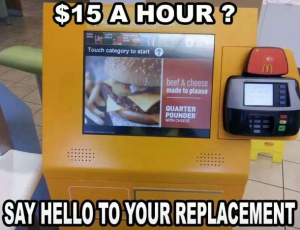Several weeks ago during the brief attention paid by the media to fast food workers on strike, one of my friends shared this grammatically inept meme on Facebook:

This is the sort of bizarro-populist right wing message that resonates with Regular Americans with no particular interest in or knowledge of politics, economics, or anything else relevant to the topic. It's a mildly amusing take on a remarkably dark undercurrent in the psyche of our business and financial elite: the yearning for some future techno-society in which robots will do everything and human beings with their pesky wages and benefits and refusal to work 24 hours per day will become totally unnecessary. Once our economic betters have figured out how to get you to work for minimum wage and without benefits, the logical next step – the only means of further Controlling Costs, in fact – is to find a way to avoid paying you at all.
Whenever I hear something that touches on this theme I cheer myself up with thoughts of the times "We'll replace you with robots!" has been tried and ended in miserable failure. Here's an example: did you know, despite this fact being absent both from Michael Moore's ultra-liberal documentary and ten thousand mainstream media accounts of GM's bankruptcy a few years ago, that the financial collapse of what was once the world's largest corporation was precipitated by Roger Smith's bright idea to replace all of the autoworkers with robots? True story. General Motors under Smith spent $90 billion on robotics and automation in nine years.
Think about that for a second. Ninety billion dollars. $90,000,000,000.00. Of course none of it worked, with factory robots breaking down constantly, painting one another, and welding car doors shut. It's easy to say that the company got what it deserved and forget about it. But think for a second about the mindset of a group of people so committed to the concept of eliminating the workforce (and the UAW) that it would piss away ninety billion dollars trying to do it.
buy lipitor online buy lipitor no prescription
Even if the Worker Bots worked flawlessly, how could that possibly make financial sense? How many decades and centuries of "savings" from lower wages to earn back those sunk costs?
buy diflucan online buy diflucan no prescription
And how much money would the Robo-Factories demand in the future for maintenance, upgrades, and eventual replacement with newer and better technology? For $90 billion, GM simply could have purchased Toyota, Honda, Nissan, and most of its other foreign rivals – several times over. Of course, in that scenario they'd still have to pay people to make cars.
The fact is that General Motors didn't go bankrupt, it committed financial suicide because its executive culture fostered a loathing for the UAW and the hourly workforce that was so extreme that it obliterated basic logic and business sense. The idea was not to replace the workers with Japanese robots (GM Robotics was acquired from Fujitsu) because it would save money; it was to replace the workers with robots because fuck the workers. Try to picture the mindset of people who would rather run their company into the ground than give their grunt employees a Cost of Living raise. It's like an airline that would rather blow all of its planes up on the runway than give passengers an entire can of soda.
But enough about Delta.
When GM finally circled the drain we were treated to hundreds of tales of largely symbolic and irrelevant white collar largesse – Executives used private planes to fly to Washington and beg for a bailout! – and uppity auto workers livin' large; the preferred strategy in most of the right-wing media was to bleat the phrase "JOBS BANK!" like a kid with Tourette's and a two-word vocabulary. No one seemed to remember that GM was doing just fine until Roger Smith, a man who had clearly watched too many episodes of The Jetsons at half-mast, ruined the corporate product line (Have worse cars ever been made in the United States than 1980s GM products?) and decided that getting rid of anyone who didn't have a white collar job was worth any cost.
Most people in charge of major corporations like fast food chains are just as greedy as Roger Smith but not nearly as stupid.
McDonald's hasn't turned its restaurants into a giant automated vending machine because they know it won't work. But I bet their boardroom is full of people dreaming of a future in which it will.
 For years now the internet has been blanketed with Ruin Porn and other voyeuristic stories about the decline of cities like Detroit. Anyone who follows the news even superficially or spends a good amount of time on the internet can probably draw Detroit's
For years now the internet has been blanketed with Ruin Porn and other voyeuristic stories about the decline of cities like Detroit. Anyone who follows the news even superficially or spends a good amount of time on the internet can probably draw Detroit's